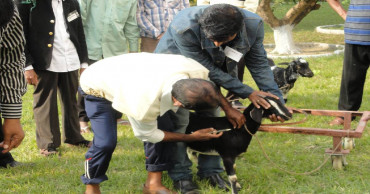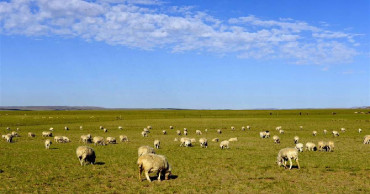livestock
Govt clears Tk 100cr subsidy, 20% power rebate for fisheries, livestock
The government has approved a Tk 100 crore subsidy and a 20 percent rebate on electricity bills for marginal-level fish farms, hatcheries and livestock, and poultry farms to reduce production costs and stimulate investment in the sector.
The Ministry of Fisheries and Livestock said on Monday that the decision was taken following a directive issued by the finance ministry on January 22.
Under the existing electricity rebate policy, a 20-percent rebate is being provided to 16 sectors to boost agricultural production, encourage agro-based exports and support industrial growth.
Of these, four sectors under the Ministry of Fisheries and Livestock have been included in the subsidy scheme, with the Finance Division approving a Tk 100 crore allocation in principle.
The sectors brought under the facility include animal and poultry feed manufacturing, fish feed production, the poultry industry, and dairy processing industries—such as milk pasteurisation, powdered milk, ice cream, condensed milk, sweets, cheese, ghee, butter, chocolate and yoghurt.
The ministry expects the initiative to significantly lower production costs, attract greater investment and strengthen the country’s capacity to produce safe and quality animal protein.
According to the directive, the Power Division will annually review rebate claims submitted by electricity distribution companies and send proposals for the four relevant sectors to the Ministry of Fisheries and Livestock, while proposals for the remaining 12 sectors will be sent to the Ministry of Agriculture.
After verifying the eligibility of rebate-receiving sectors, the two ministries will forward fund release proposals to the Finance Division.
Funds will be released to electricity distribution companies on a half-yearly basis. The second-half release will be subject to completion of audits, and rebate-receiving sectors must be clearly mentioned in audit reports.
A draft policy for selecting eligible consumers will also require prior approval from the Finance Division.
Each beneficiary must have a separate electricity line and meter for the relevant sector, and the rebate amount cannot be used for any other purpose. Any violation will make the concerned parties liable, the finance ministry cautioned.
1 month ago
Human chain in Kurigram demands arrest of livestock thieves
Villagers formed a human chain demanding the arrest of livestock thieves in Nageshwari upazila of Kurigram on Friday.
The human chain on Matherganj Bazar Road under the upazila lasted an hour in the morning.
Villagers of Char Krishnapur organized the unusual human chain to draw the attention of the authorities to rampant thieves in the area targeting farmers' cows and buffaloes.
The farmers at the human chain said they were forced to mobilise such a programme after failing to get justice.
Read: 'Cattle thief' beaten to death in Noakhali
Rather they were subjected to attacks by the thieves when they appealed seeking justice.
On behalf of the villagers, farmers Anwar Hossain, Abdul Khalek, Habibur Rahman spoke at the programme.
3 years ago
New breed of sheep brings fresh hope to Jamunar Char
The main worries of sheep farmers are heat stress, drought and flooding.
Many lose their cattle, sheep, goat and poultry farms due to floods. Thinking ahead is crucial to cut costs, risks and concerns in future.
Also, climate change could present more challenges to cattle and sheep producers in the future, impacting production by hurting fertility or growth.
Read: Jashore vegetable farmers toil hard to catch the early winter consumers
There is no way to prepare for every situation that arises in a disaster.
However, advanced planning can help the producers minimise the loss of animal lives and the health problems associated with all disasters.
Studies suggest more research for drought-tolerant cattle, sheep, goat and poultry breeds.
The women of Gaibandha's disaster-prone Jamunar Char, for example, have learned to stand on their own two feet after raising disaster-ready sheep.
Read Gazipur farmers worried over shortage of goat vaccines
Improved breed, disaster tolerance, and high fertility rate of these animals are encouraging the women of the char to raise them in bigger numbers.
Saiduzzaman, chairman of Mollar Char, said: "Gaibandha has 165 chars across the rivers Teesta, Jamuna and Brahmaputra. At least 3 lakh people live here."
Shilpi Begum, a resident of one of the chars, said people of these areas depend on agriculture and livestock for their livelihood and survival.
"We are happy people even after braving all the disasters throughout the year. Selling cattle, goats, chickens, ducks, helps us overcome many dangers and hardships."
Read Unusual goat with two heads, eight legs born in Chattogram
"Although people would raise livestock here before, no one was involved in sheep farming. I started with one sheep and now own five. Selling these animals will help me weather the storm and also turn my wheel of fortune," the char dweller said.
4 years ago
Mobile stalls selling livestock, dairy products during lockdown
A fleet of mobile stalls under the Ministry of Fisheries and Livestock are selling fish, meat, egg and dairy products during the lockdown to mitigate the loss of farmers.
Livestock and dairy products worth around Tk 133.21 crore have been sold since April 5.
The production, transportation, supply and marketing of this campaign is being monitored by Minister SM Rezaul Karim himself.
Read Lockdown: Sirajganj dairy farmers in trouble again
Even during this crisis, the Ministry and officials and employees of the Department of Fisheries and Livestock are carrying out mobile sales activities in the public interest at the risk of their lives, he said.
He noted that the dairy associations, poultry associations, fishermen's associations and marginal farmers associated with this sector are continuing this activity braving the risk.
Read Govt forming policy to safeguard poultry, dairy industries
"The farmers in the fisheries and livestock sector are able to easily overcome the losses by marketing the products produced at a fair price. On the other hand, thanks to this initiative, consumers can easily buy fish, meat, milk, eggs and dairy products even under the current restrictions, " he added.
He made these remarks in a briefing arranged to thank the officials involved with the campaign.
Read Railway launches luggage van to transport vegetables
4 years ago
Lockdown: Sirajganj dairy farmers in trouble again
The dairy farmers of Shahjadpur upazila in Sirajganj district have run into trouble again as the ongoing lockdown has choked the sales of milk they produce.
Shahjadpur upazila produces some 20.50 lakh litres of milk a day, but now thousands of litres of milk are wasted due to drop in its sales and lack of storage facilities, the farmers alleged.
As the demand for milk in the open market is declining due to the closure of sweetshops, tea stalls and lack of people at haats and bazaars, farmers are counting huge losses.
Visiting different areas of the upazila, the UNB correspondent found many of the farmers staging protests by dumping milk on the streets. Many farmers were also seen roaming at local markets to sell off cows as no option is left for them.
Also read: Jashore dairy farmers count losses as demand falls
According to Sirajganj District Livestock office, a milk-processing factory was set up in 1983 in Sirajganj by Milk Vita, a cooperative state-owned enterprise. And then the upazila saw the mushrooming of cattle farms within years.
4 years ago
Remote areas to get improved livestock breeds: Minister
Fisheries and Livestock Minister SM Rezaul Karim has said the government is working to spread the improved species of livestock to remote areas of the country in a scientific way.
5 years ago
Avoid artificially fattened cattle during Eid: Experts
Livestock experts have urged people to avoid buying and consuming meat of sacrificial animals that have been artificially fattened using steroid, warning that meat from such animals is very harmful for the human body.
5 years ago
Egypt interested to help Bangladesh in fisheries, livestock sectors
Egypt has expressed interest to help Bangladesh to boost production of fish and livestock.
5 years ago
Gazipur farmers worried over shortage of goat vaccines
Farmers in Gazipur are dealing with an acute shortage of goat vaccines after supplies from the district livestock office have run out, leading to a great anxiety among the farming community here that their farms could be destroyed in the absence of timely vaccination.
District livestock officials said they have taken necessary measures to collect the requisite goat vaccines from the capital, which would be delivered within this week in line with the needs of the district.
According to information of the district livestock office, there are about 3,000 goats in 25 farms across different upazilas of the district.
6 years ago
Cold winter kills 2,600 head of livestock in Mongolia
Extremely cold winter known as dzud in Mongolia has killed more than 2,600 head of livestock in January in the western province of Uvs alone, Mongolia's National Emergency Management Agency (NEMA) said Wednesday.
6 years ago


.jpg)

.jpg)

.jpg)
.jpg)





